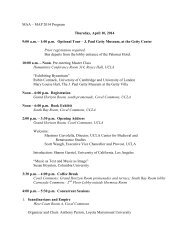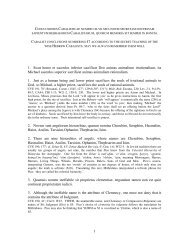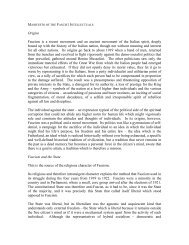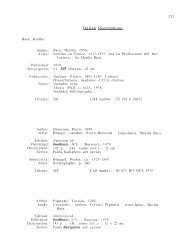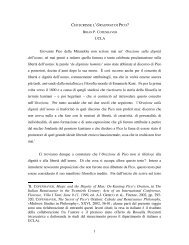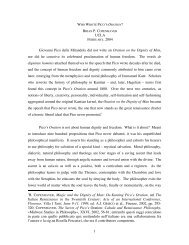1 (1) Pythagoras of Samos instructed the region of Italy once called ...
1 (1) Pythagoras of Samos instructed the region of Italy once called ...
1 (1) Pythagoras of Samos instructed the region of Italy once called ...
You also want an ePaper? Increase the reach of your titles
YUMPU automatically turns print PDFs into web optimized ePapers that Google loves.
(13) For what is <strong>the</strong> point <strong>of</strong> this word in ‘<strong>the</strong> stone is a being,’ which is ‘that thing which<br />
is’? What do <strong>the</strong> words ‘that which is’ represent since ‘<strong>the</strong> stone is a thing’ is more<br />
explicit, unencumbered and to be preferred? When I have silver, I no longer want slag. I<br />
do not want <strong>the</strong> trace <strong>of</strong> grain that exists in a heap, especially since this expression seems<br />
absurd: namely, ‘<strong>the</strong> stone is that thing which is’ or ‘<strong>the</strong> stone is a thing which is,’ as if,<br />
strictly speaking, <strong>the</strong>re were nothing but <strong>the</strong> stone by itself, or whatever <strong>the</strong>re would be <strong>of</strong><br />
which we might say that it is ‘a thing which is,’ an expression belonging to God alone.<br />
(14) On this basis, <strong>the</strong> Apocalypse says ‘<strong>the</strong> Lord God who is,’ ho ôn, in <strong>the</strong> masculine<br />
gender, and ho ôn is used in Genesis as well, ‘He who is sent me,’ <strong>the</strong> reason being that<br />
only God is in <strong>the</strong> strict sense, whereas o<strong>the</strong>r things compared to God are not, truly and<br />
strictly speaking. 35<br />
In <strong>the</strong> neuter gender <strong>the</strong> expression is also used properly <strong>of</strong> God: ‘God is being,’ meaning<br />
‘that …’ or ‘that thing which is.’ For all <strong>the</strong>ologians acknowledge that God too is a<br />
thing, which <strong>the</strong> Greeks were right to describe as ‘ontôs,’ ‘really’ or ‘unqualifiedly,’ and<br />
as ‘tô onti,’ ‘in fact’ or ‘actually.’ Therefore, when a thing o<strong>the</strong>r than God is said to be a<br />
‘being,’ <strong>the</strong> statement is absurd. Nor is it without reason or point that <strong>the</strong> greatest Latin<br />
authors rejected this term, (15) which Aristotle makes more absurd by adding to it, saying<br />
‘to on hê on,’ ‘being as being,’ as if what is were able not to be. 36 This second ‘being’ is<br />
actually a participle, and here too is a common mistake when some say ‘<strong>the</strong> stone is’ or<br />
‘<strong>the</strong> person is’ and <strong>the</strong>refore ‘being is.’ ‘Being’ here is not a noun but a participle, if only<br />
<strong>the</strong>se people would admit that a verb may be analyzed into its participle and a substantive<br />
verb, as <strong>the</strong> next book will argue.<br />
(16) Let us put an end to this question, <strong>the</strong>n, and cause no fur<strong>the</strong>r delay for <strong>the</strong> many<br />
peoples and nations eagerly awaiting <strong>the</strong>ir king (as I have already noted). And as <strong>the</strong><br />
power <strong>of</strong> planning and God’s will ra<strong>the</strong>r than a servant’s cunning caused <strong>the</strong> horse <strong>of</strong> our<br />
Darius to whinny, 37 let <strong>the</strong>re be no more debate about <strong>the</strong> kingdom. Like <strong>the</strong> five<br />
Persians, let <strong>the</strong> o<strong>the</strong>r five terms – ‘something,’ ‘being,’ ‘one,’ ‘true,’ ‘good’ – climb<br />
down from <strong>the</strong>ir horses. Let <strong>the</strong>m fall down and worship ‘thing,’ which is <strong>the</strong> only true<br />
king among <strong>the</strong> six, as <strong>the</strong> five Persians worshipped Darius <strong>once</strong> <strong>the</strong>y had understood that<br />
he was <strong>the</strong>ir king. (17) This is why Ulpian says that “<strong>the</strong> praetor chose ‘thing’ because it<br />
is a comprehensive word.” 38 He did not say ‘being’ or ‘true’ or ‘good’ or even<br />
‘something,’ whose meaning is nearly <strong>the</strong> same as ‘thing,’ as I have said. Accordingly,<br />
we also use this word in a comprehensive sense wherever we like, as in ‘things’ about<br />
marriage or farming or navies or armies, and as in ‘I come to <strong>the</strong> thing.’ And for a<br />
comprehensive interrogative, which I will deal with later, we have ‘what?’ or ‘what<br />
thing?’ But ‘what thing’ applies to all <strong>the</strong> predicaments because each <strong>of</strong> <strong>the</strong>m is a thing.<br />
35<br />
Rev. 1:8; cf. 4:8; Exod. 3:14 (Vulg.) – not Genesis, as Zippel points out.<br />
36<br />
Arist. Meta. 1003a21, 1005a3, 13, 28.<br />
37<br />
Herodotus (3.86) tells <strong>the</strong> story <strong>of</strong> an omen that clinched <strong>the</strong> choice <strong>of</strong> a Darius as king. His servant had<br />
arranged things so that his stallion would whinny impressively when brought near a particular mare.<br />
38<br />
Valla, an expert on law, cites Ulpian, a great authority on ancient Roman law, from a famous passage in<br />
<strong>the</strong> Digest <strong>of</strong> Justinian (12.1.1) where <strong>the</strong> topic is contracts. In formulating <strong>the</strong> law in question, <strong>the</strong> praetor<br />
(a Roman magistrate) wanted to use <strong>the</strong> most comprehsensive term available.<br />
10<br />
2/21/05 9:35 PM 10/44



